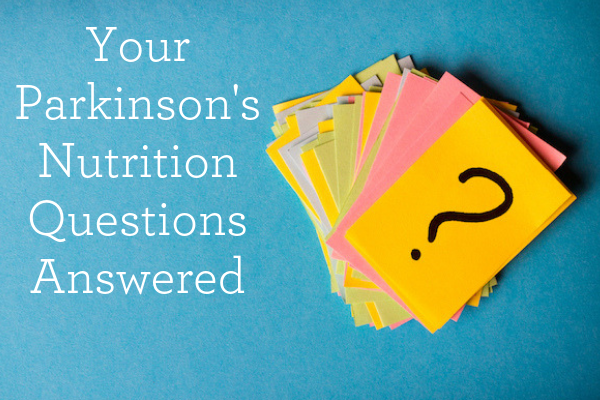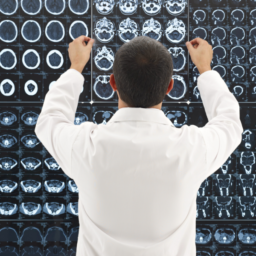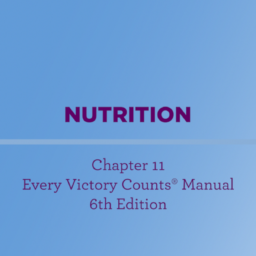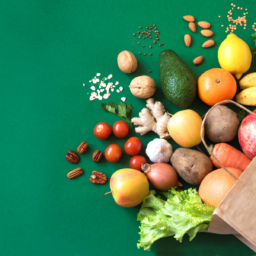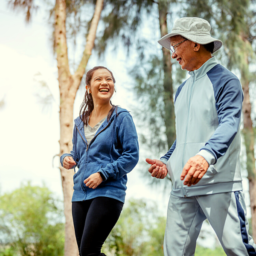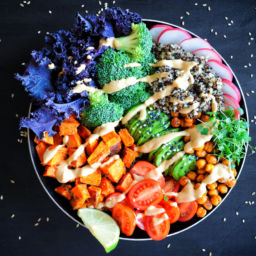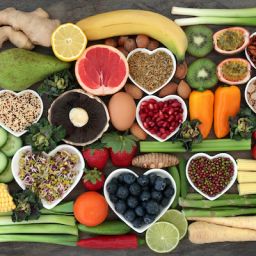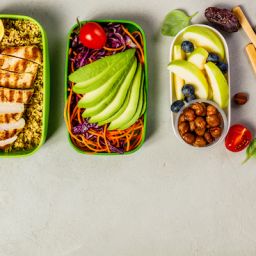One of the topics our community members consistently ask us about is nutrition. It’s not an easy topic to address, though, because it has so many layers and there’s no one size fits all nutritional plan. Still, leaving it at that is not enough. In the first post in this series, we addressed the most important fact to know about Parkinson’s nutrition and in the final post, we’ll address how to experiment with your nutrition while living with Parkinson’s. In this post, we opened up our inbox and pulled together the 17 most common questions we’ve received in the past year about Parkinson’s nutrition, and we’ve done our best to answer them.
We wish there were more definitive answers to these questions and that there was such thing as the one, proven nutritional plan that works for all people trying to live well with Parkinson’s, but that’s not the case. The best we can do for now, therefore, is share the research as it stands, suggest potential pathways for you to investigate with your care team and encourage you to find the optimal path for you, even if it takes some time and a fair bit of trial and error.
With that said, here we go…
“I keep losing weight (that I don’t want to lose). What’s happening and what can I do about it?”
Weight loss is a common side effect of Parkinson’s. In fact, in many cases, weight loss precedes motor symptoms and is considered an index for Parkinson’s progression. There are a variety of potential causes at play such as overall malnutrition, increased energy output and decreased energy input and problems with nausea or vomiting and lack of appetite. The best thing to do if you have unwanted weight loss is to talk to your doctor about creating a plan to manage your caloric intake. Creating a meal plan to gain and then maintain your weight will vary by individual, but avocados, shakes, smoothies, nuts, and seeds are all simple ways to consider adding nutritional calories to your diet. If loss of smell is a problem for you, you can also consider using more spices to make your food taste better.
Parkinson TV – Nutrition and Parkinson’s: Episode 3
“No matter what I do, I keep gaining weight. What’s happening and what can I do about it?”
Weight gain is another common side effect that can occur from a decreased ability to exercise or as a result of gastric emptying, in which you may feel like you’re uncontrollably gaining weight despite not eating much. The discrepancy may have to do with your body going into starvation mode as it tries to recalibrate your energy input and output. Again, the best course of action is to speak with your doctor about a weight loss plan that aligns with your specific issues and goals. Also, you might consider an anti-inflammatory diet if you’re suffering from weight gain associated with gastric emptying. (More on that below.)
“I’m constipated all the time. Is there anything I can do?”
Constipation is the most common gastrointestinal problem for people with Parkinson’s. Increasing the amount of water you drink and your fiber intake are two things you can do to try and improve symptoms of constipation. Most experts recommend at least six to eight glasses of fluid a day, and some recommend prune juice as an excellent way to increase fluid intake and relieve constipation. Increasing the number of high fiber fruits like apples, prunes, dates, figs, radishes, berries, nuts and beans and insoluble fiber from whole grains like brown rice and rye can also help relieve your constipation. Remember that introducing additional fiber should be done slowly to allow for your digestive system to adjust to the effects.
“If I take regular doses of carbidopa/levodopa, should that impact when and what I should eat?”
Yes. The effect of levodopa may be influenced by proteins in food. Proteins can compete with levodopa uptake both from the gut and across the blood-brain barrier and may, therefore, inhibit the effect of levodopa. Therefore, if you take regular doses of carbidopa or levodopa, you should talk to your doctor about taking your medicine 30-60 minutes before eating, especially before high protein meals. Protein, however, is still important for your diet so it can be helpful to create a schedule to manage your medication and protein intake throughout the day so that you’re not eating your high protein meals simultaneously with your carbidopa/levodopa.
“I’ve heard so much about the (keto, vegan, paleo, vegetarian, raw, etc.) diet for people with Parkinson’s? Does it really work?”
Despite the buzz, there’s no one diet that has been shown to be universally beneficial for people with Parkinson’s.
The ketogenic diet has received a lot of attention recently as it can be beneficial for patients with epilepsy and early trials are being done on rat models to see if the same is true for Parkinson’s; however, there is not yet significant evidence that it is therapeutic for Parkinson’s.
Some people with Parkinson’s find that gluten can be inflammatory to their gut and cause digestive distress. If this is the case for you, introducing a gluten-free diet may help relieve some of your symptoms.
When it comes to vegan, paleo and vegetarian diets, no conclusive evidence finds one to be therapeutic for Parkinson’s. Still, speak to people with Parkinson’s who’ve done some experimenting, and you’re likely to find plenty of people who sing the praises of one diet vs another. In the end, it comes down to experimentation and discovering what works best for you based on your symptoms and goals.
“Lately, I’ve been having a lot of trouble with chewing and swallowing. It makes it really difficult to eat. What can I do?”
This is a common problem many people with Parkinson’s struggle with. One thing you can do is to work with your food’s consistency and consider softer food, like applesauce or slow-cooked meats. It can also help to add moisture to foods with gravy or sauce so that your food is easier to swallow.
Another option is to partially blend your meal. You can do this by putting 75% of your meal in the blender and saving the rest to eat as solid food. Crock pots are also great for cooking meats or vegetables so that they are really tender and easy to swallow. If you have trouble swallowing liquids, you can thicken fluid with things like applesauce. You can also consider meeting with a speech-language therapist to find specific ways to improve your chewing and swallowing.
“I was telling someone at my Parkinson’s support group about the pains I have in my stomach, and he mentioned something called gastric emptying. What is it and if that’s my issue, what can I do about it?”
Gastric emptying or gastroparesis relates to a delayed movement of food from the stomach to the intestines that can cause stomach pains, bloating, nausea and feelings of uncomfortable fullness after only a bite or two of food. It’s not known whether this condition is associated with Parkinson’s itself or levodopa treatment, but whether it is or isn’t, there are a few things you can do to address your symptoms such as trying smaller but more frequent meals of easy-to-eat anti-inflammatory foods and limiting caffeine, alcohol, grains and dairy. Currently, there is no medication for gastric emptying that is compatible with people with Parkinson’s, but you can talk to your doctor and your nutritionist about other possible strategies and treatments.
“Should I take supplements?”
In general, it’s best to get vitamins and minerals from the food you eat rather than through supplements. And while there is some research that shows that supplemental Vitamin D and calcium may be beneficial in promoting bone health if bone thinning is an issue for you, there’s much debate about that as well. The truth is, no supplements have been proven beneficial to Parkinson’s. Again, it’s important to talk to your doctor about any supplements you think might be beneficial to introduce into your diet as there have been some cases where unregulated supplements have made Parkinson’s symptoms worse.
“What should I eat before and after I exercise? (I usually take my carbidopa/levodopa about 30 minutes before my workout, and I take it every four hours.)”
In the same way that there’s no one diet for anyone, the timing of your meals before and after exercise will largely depend on you. While it’s important to limit your protein intake after taking your carb/levodopa, if you want a pre-workout snack, you can choose something light and carbohydrate-based, as this won’t interfere with the absorption of your medicine. After you work out, it may be a good time for a protein-rich snack, so long as it is eaten at least 30 minutes before your next dose of medicine. With that framework, the exact type and timing of snacks before and after exercise is something that you can experiment with and talk to your doctor about.
“I’ve heard a lot about the benefits of drinking coffee lately. Is it really beneficial for people with Parkinson’s?”
It is not clear whether there are any benefits to drinking coffee for people with Parkinson’s. The consensus from the Parkinson’s Foundation is that drinking coffee has no measurable benefits on the symptoms of Parkinson’s, but neither should it worsen symptoms in most cases. The majority of the recent research that has come out about coffee has to do with its ability to reduce the risk of developing diseases such as Parkinson’s and Alzheimer’s. Once you have already developed Parkinson’s, its benefits are debatable.
So, provided it doesn’t irritate your stomach, coffee is okay to drink, but you should talk to your doctor about any symptoms associated with drinking caffeine (it can be a bladder irritant, for some). Coffee can help if you suffer from daytime sleepiness, but consider having your last cup before the afternoon as caffeine late in the day can interfere with your sleep cycle if you’re especially sensitive to it.
Two compounds in coffee may team up to fight Parkinson’s
“Can I drink alcohol?”
There’s no definite answer as to whether alcohol has any effect on the symptoms of Parkinson’s; however, like caffeine, alcohol can be a bladder irritant to some. If this is the case for you, avoiding alcohol may help alleviate urinary discomfort. Similarly, alcohol late at night may interfere with your sleep and if that is a problem for you, avoiding it may help you sleep better through the night.
“What should I know about nutrition as it relates to the use of medical marijuana?”
Currently, there’s no legally prescribed medical marijuana for Parkinson’s treatment, but for some people with Parkinson’s, certain strains of medical marijuana and CBD oil have been found to be anecdotally helpful in alleviating tremors. And many people use it as part of their comprehensive nutritional plan. Unfortunately, there haven’t been enough clinical trials completed that provide indisputable evidence for the benefits of medical marijuana. If you live in a state where medical marijuana is available, be sure to talk to your doctor before you give it a try.
Our previous posts about marijuana
“I have terrible insomnia. Are there any nutritional choices I can make that might help me fall asleep and stay asleep longer?”
Sleep issues are very common among people with Parkinson’s. In fact, changes in sleeping habits are often among the first signs of Parkinson’s.
Fortunately, there are changes you can make to improve your ability to get the rest you need.
Sleep hygiene is an umbrella term for different actions you can take to enhance your sleep. Practicing good sleep hygiene can go a long way towards improving both the quantity and the quality of your sleep each night. When it comes to optimal nutrition for sleep, most doctors and dieticians recommend watching what you eat and when you eat it, limiting your fluid intake (especially alcohol and coffee) and limiting your sugar intake.
If your poor sleep is actually a result of REM Sleep Behavior Disorder (RBD), be sure to speak with your doctor and your care partner so you can get the help you need.
Make the Best of a Bad Night’s Sleep
Living Well with REM Sleep Behavior Disorder with Benzi Kluger
“I have difficulty drinking the “recommended daily allowance” of water. How critical is it that I drink that much?”
Drinking enough water is important to help promote general health and relieve symptoms of constipation. When someone experiences long periods of dehydration, their cells can’t function properly and die, which can lead to degeneration and disease. Dehydration also leads to poor circulation and blood flow, which can result in high blood pressure, organ failure and more.
You may experience decreased thirst with Parkinson’s, so it can be helpful to create a hydration plan, carry a water bottle and track your daily water intake to ensure you’re drinking enough. If drinking water is a challenge, you can also supplement your fluid intake with juice—if unintended weight gain isn’t a problem for you—or decaffeinated tea.
Dehydration in Parkinson’s: Symptoms, Risks & Tips
“Is there anything I can do with my diet to manage the side effects I experience from all of the medications I take?”
Depending on the side effects you experience, there may be ways to help minimize them with your diet. For example, if you experience nausea, eating bland foods like saltines and cold liquids may help, as can eating slowly and in smaller portions. Again, if your side effects are unbearable, talk to your doctor as soon as possible to see if they can adjust your medications or suggest other alternatives. Unfortunately, there’s been no evidence to suggest that the food you eat can eliminate side effects altogether; however, experimenting with various nutrition plans may certainly help you manage them better.
“There’s a lot of information out there about the link between the gut and brain and inflammation in diseases such as Parkinson’s and Alzheimer’s. What’s important for me to know about it and what are some of the healthiest anti-inflammatory foods I can eat? What foods should I stay away from?”
The bottom line is that despite increasing evidence that there’s an association between Parkinson’s and gut health, our understanding is incomplete.
Studies have found that there are lower levels of Prevotella, a “good” gut bacteria in people with Parkinson’s and higher levels of inflammatory bacteria, but more research is needed to understand the connection to Parkinson’s. Still, eating a diet rich in anti-inflammatory foods is generally found to be beneficial for your overall health and there’s no harm in including anti-inflammatory foods in your diet if you can tolerate them.
Some healthy anti-inflammatory foods include coconut oil (which contains medium-chain triglycerides), as well as fatty fish like salmon or tuna, dark leafy vegetables, tomatoes, nuts and soy. Curcumin, found in turmeric, is another powerful anti-inflammatory compound. While probiotics do not contain the health-promoting gut bacteria that are missing in people with Parkinson’s, some studies suggest that probiotics can be helpful for constipation in Parkinson’s.
The top foods to stay away from if gut inflammation is a problem for you include refined carbohydrates, white bread and pastries, French fries, soda, red meat and margarine.
Dive Deep: The Link Between Parkinson’s and the Gut
“Could my diet actually reverse or even cure my Parkinson’s?”
There’s no evidence to suggest that any diet (or, unfortunately, anything whatsoever) can reverse or cure Parkinson’s. However, if you find a diet or nutritional plan that works for you, you may very well be able to ease your symptoms.
Do you have a question about nutrition we didn’t answer?
If so, please leave a comment below or email us at blog@dpf.org.
In the final post in this series, we’ll address how to experiment with your nutrition while living with Parkinson’s.


